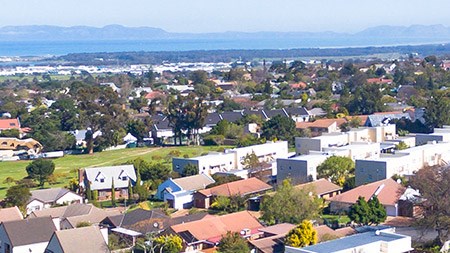Renting a home is proving to be a very practical option for many South Africans in the current property market.
Difficulty in obtaining bond finance, affordability, and the flexibility that renting a home offers are just some of the reasons why this market is currently operating in full swing. The current state of affairs The Trafalgar residential rental index rose by 11,2% in the year to June, indicating that residential landlords are enjoying respectable increases.
This is despite signs of South Africa's residential tenants coming under increasing financial strain. However, rents have only increased nationally by 7,5% since the beginning of the year and it is possible that growth will fall further to December and into 2010. This is according to Andrew Schaefer, Trafalgar’s managing director, who says: "It’s possible that the index can turn negative next year if job losses continue. At this stage we think a fall is unlikely. If it happens it will be the first time since 1976/77. It shows how steady and predictable residential rental is - if it is properly managed." Herschel Jawitz, chief executive of Jawitz Properties, says the rental market is currently fairly strong, especially for owners and investors. “The rental market,” he says, “is generally counter-cyclical to the sales market. While in the early 2000s interest rates were low and property prices were coming off a low base, most people were looking to buy property as opposed to renting and the rental market was weak. Now, however, supply of new rental units has all but dried up and many home owners have been forced into the rental market due to financial pressure.
With demand now exceeding supply, rentals are rising and yields are up close to 10% again.” Pam Golding Properties’ rentals director, Dexter Leite, says that there are a number of drivers in the market, most notably the global economic downturn, which has had a ripple effect. “I believe we will continue to see a demand for rental properties for some time, which is not to say we won't also sell,” he says. There is no doubt that the last five years have seen a shift in rentals on many fronts, says Lew Geffen, chairman of Lew Geffen Sotheby’s International Realty South Africa. Geffen points out that in 2005 average monthly rentals were 1% of value, thus an investor was looking at returns in excess of that which they were able to achieve on cash deposits. “In 2009 the rental returns are between 0.4% and 0.5% of value, which has been outstripped by returns achievable in this high interest rate climate by cash deposits.” Geffen says that with interest rates dropping and continuing to drop in the foreseeable future, it is possible that the rental:value ratio may start to increase again.
All aboard the rental bandwagon
Do agents swing towards rentals in a recessionary market? Tony Ketcher, managing director of Seeff Properties Randburg says that in these tough times, specifically over the past 18 months, many of the agencies have used a focus on rentals to ensure an additional income to cover their costs and to keep their heads above water. “There is also no waiting time for the income because you can claim your commission shortly after the lease agreement is completed, whereas with sales, agents need to wait for registration of the property which can be anything from four to 12 weeks.” Ketcher also says there is great synergy that can be achieved between sales and rentals. Leite does not agree that there is a switch to rentals. “In some cases yes, but it is a very different business as it is volume-driven with different laws and protocols applicable. It is not necessarily everyone’s choice vocation. I believe that overall only a small percentage would or have moved to rentals as a supplemental or replacement income. It also takes time for any business or career to go through a learning curve, and returns are not instant,” says Leite. Jawitz also doesn’t think that agents have necessarily switched to rentals. “However,” he notes, “many agencies are relying on rentals as a much bigger part of their income and cash flow than before.” Geffen attributes the state of the rental market to an increase in lessees, and increase in lessors and an increase in the number of agents. ”In these times, renting is seen as a more flexible option than property ownership,” says Geffen. “In addition, there are those who choose to let their properties in order to meet bond repayments and then there is the buy-to-let phenomenon, which took off over the last few years. With banks introducing special products geared towards this market of investors, along with a large number of units coming on stream, rental returns dropped due to the supply-demand situation. “Furthermore, the perceived regular income of the rental agent is attracting agents into this sector, as the sales arena has been depressed due to falling prices and the increasing rate of declines in bond grants,” says Geffen.
Money talks
How is the cost of a rental determined? Jawitz says the price of a rental is determined in more or less the same way as for the sale of a property. “The rental valuation will include the type, standard and size of the accommodation for the property and area as well as relative to what else is on the market.” For example townhouses or clusters dictate a higher premium because of factors like convenience and security. He says the rule of thumb for a rental is generally 1% of the value of a home. “When the rental market softened in the mid 2000s this percentage fell to as low as half a per cent and is now back to approximately 0.8%.” Tracy Pugin rentals licensee for Seeff Randburg, says it’s a matter of supply and demand among other factors, and is usually 0.6% of the purchase price. Leite notes that the costs are very area-specific, i.e. generally, rentals achievable represent a percentage of the value of a property in any given area, further dictated by supply and demand in a particular micro market. “Ultimately,” he says, “supply and demand will dictate as prospective tenants make offers on asking rentals.
Statistics at a glance
What is happening to rental markets around the country? The Trafalgar residential rental index was pulled up by an unusual 21,5% increase in rents in Pretoria that has a large population of civil servant tenants whose jobs are secure. Cape Town (9,9%) and East London (9,5%) were the only cities where rents rose in single digits. But despite lagging the rest, East London’s index at 190 has shown the biggest growth from the 100 base-year in December 2003. Cape Town at 155 is the laggard over the 5½ years. The only cities to show annualised double-digit increase in the first six months of 2009 were Port Elizabeth (18%) and Pretoria (21,5%). Johannesburg, which increased 12,2% in the year to June rose only 5,3% annualised in the first six months of this year. The general consensus seems to be that agents are not particularly switching to rentals now that the sale market is depressed and the rental market is booming. They are, however, maximising any additional income that rentals may generate in order to survive the current market conditions. So, rentals are here to stay; it’s just the returns – for both agents and landlords – that will differ.
Rental overview of prime areas Gauteng
Pugin says that the current state of the rental market is very active with both stock and prospective tenants. She says tenants have too much to choose from and therefore take much longer to commit to a specific property. “Just a year ago higher rentals were being achieved; now tenants have the over-supply to negotiate with – it is their market at the moment,” she says. Rental markets, she says, will always be active, but rentals will not increase until stock declines a little and we see more demand for the middle end of the market. “Nevertheless the R3000 - R5000/month rental market will always be in demand, and owners in possession of such properties would do well to hold on to them.”
Western Cape
There is ongoing demand for rental properties in the Cape Town metropolitan area, and Pam Golding Properties reports high volumes of rental deals, especially long-term rentals, with an ongoing demand for properties in the upper price brackets. Pam Golding Properties’ recent rental figures indicate that renting a home in Cape Town is definitely not solely the domain of would-be buyers who can’t afford to purchase property as the rental agents have included several high-end deals in the period from April to June, including a rental of R28 000/ month for a four-bedroom home on the Sunset Links golf course, and a R28 000/ month rental for a five-bedroom home in Oranjezicht with stunning mountain views, let on a fully-furnished basis for one year to international visitors.
KwaZulu-Natal
In 2006, Durban rentals rose 9,2% to 143 against the 9% hike to 136,5 nationally, reflecting the extent to which residential rentals are moving inexorably upwards. In the year to December 2006, rentals rose 6,4%, but the long-term trend promises that annual rental increases will top double-digit growth over the next decade. Statistics documented in January 2009, show that approximately 19% of all households in the province rent their primary dwelling. According to General Household Survey data, the KwaZulu-Natal rental market has grown at an average rate of 5.2% per annum since 2002, just below the national average rate of 7.7%. Article courtesy of  , and is taken from their September / October 2009 Issue.
, and is taken from their September / October 2009 Issue.



